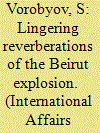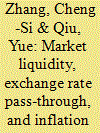| Srl | Item |
| 1 |
ID:
085689


|
|
|
| 2 |
ID:
185047


|
|
|
|
|
| Summary/Abstract |
ON AUGUST 4, 2020, residents of the Lebanese capital witnessed and many fell victim to a real tragedy - a massive explosion of 2,750 metric tons of ammonium nitrate in a warehouse at the Port of Beirut. The explosion left more than 200 people dead, about 6,500 injured, and at least 300,000 homeless, as well as damaged the homes of countless thousands of people. The blast, equivalent to 1.5 kilotons of TNT, almost completely destroyed about 77,000 buildings. It was measured as a 4.5 magnitude earthquake, with the shockwave traveling as far as Nicosia, 251 kilometers away.
|
|
|
|
|
|
|
|
|
|
|
|
|
|
|
|
| 3 |
ID:
124405


|
|
|
|
|
| Publication |
2013.
|
| Summary/Abstract |
This paper examines the effects of market liquidity and exchange rate pass-through on domestic inflation in China from 1998 to 2008 using both univariate and multivariate dynamic models. We find the following: (1) market liquidity in China has significantly positive effects on inflation, (2) the pass-through effect of exchange rates is limited to CPI. (3) the shock to growth rate of real GDP drives domestic inflation significantly, (4) external shocks contribute little to the volatility of inflation, and (5) China s central bank should keep the growth rate of M2 as the main monetary policy instrument in inflation management.
|
|
|
|
|
|
|
|
|
|
|
|
|
|
|
|
| 4 |
ID:
085312


|
|
|
|
|
| Publication |
2008.
|
| Summary/Abstract |
This paper explores whether fixed exchange rate commitments and central bank independence have functioned more as institutional complements or as substitutes in achieving exchange rate stability. Focusing on the advanced industrial democracies in the post-Bretton Woods era, it argues that these two monetary institutions should have functioned in a non-complementary, but substitutable, manner with regards to this external policy goal. This argument is tested statistically using different measures of exchange rate variability and de facto exchange rate fixity. Finally, given evidence that fixed exchange rate commitments and central bank independence have not functioned as complementary institutions, this paper discusses why certain OECD (governments that are members of the Organization for Economic Cooperation and Development) governments nonetheless made fixed exchange rate commitments when their central bank was legally independent.
|
|
|
|
|
|
|
|
|
|
|
|
|
|
|
|